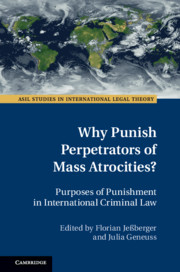Book contents
- Why Punish Perpetrators of Mass Atrocities?
- ASIL Studies in International Legal Theory
- Why Punish Perpetrators of Mass Atrocities?
- Copyright page
- Contents
- Contributors
- Preface
- Abbreviations
- 1 Introduction: The Need for a Robust and Consistent Theory of International Punishment
- 2 The Practical Importance of Theories of Punishment in International Criminal Law
- Part I Setting the Framework: Criminological, Historical and Domestic Perspectives
- Part II Rationales for Punishment in International Criminal Law: Theoretical Perspectives
- Part III Consequences for the Practice of the International Criminal Court
- 16 Prosecution Strategy at the International Criminal Court in Search of a Theory
- 17 Selectivity in International Criminal Law
- 18 Theories of Punishment in Sentencing Decisions of the International Criminal Court
- 19 Theories of Punishment at The Hague
- 20 From Punitive to Restorative Justice
- 21 Concluding Remarks
- Select Bibliography
- Index
19 - Theories of Punishment at The Hague
A Comment on the Contributions by Alex Whiting, Harmen van der Wilt and Gerhard Werle and Aziz Epik
from Part III - Consequences for the Practice of the International Criminal Court
Published online by Cambridge University Press: 07 February 2020
- Why Punish Perpetrators of Mass Atrocities?
- ASIL Studies in International Legal Theory
- Why Punish Perpetrators of Mass Atrocities?
- Copyright page
- Contents
- Contributors
- Preface
- Abbreviations
- 1 Introduction: The Need for a Robust and Consistent Theory of International Punishment
- 2 The Practical Importance of Theories of Punishment in International Criminal Law
- Part I Setting the Framework: Criminological, Historical and Domestic Perspectives
- Part II Rationales for Punishment in International Criminal Law: Theoretical Perspectives
- Part III Consequences for the Practice of the International Criminal Court
- 16 Prosecution Strategy at the International Criminal Court in Search of a Theory
- 17 Selectivity in International Criminal Law
- 18 Theories of Punishment in Sentencing Decisions of the International Criminal Court
- 19 Theories of Punishment at The Hague
- 20 From Punitive to Restorative Justice
- 21 Concluding Remarks
- Select Bibliography
- Index
Summary
Silvia D’Ascoli discusses some issues that were addressed in the contributions of Whiting, van der Wilt and Werle and Epik. She agrees that the objectives and purposes of punishment guiding the sentencing process should be predetermined by the relevant system and not decided by the judges on a case-by-case basis and is disappointed how little the ICC jurisprudence on sentencing has so far contributed to the development of rationales for international punishment. Similarly, in her view it is a missed opportunity that no clear sentencing guidelines have been determined at the ICC (as was the case at the ad hoc Tribunals), including any expressed weight, from the purposes of punishment. She recalls that the initial Prosecution’s proposition of ‘80 per cent baseline’ of the statutory maximum as a starting point to determine sentences was dismissed by the Trial Chamber – and after that the Prosecution did not propose any other approach or solution. L49
- Type
- Chapter
- Information
- Why Punish Perpetrators of Mass Atrocities?Purposes of Punishment in International Criminal Law, pp. 353 - 363Publisher: Cambridge University PressPrint publication year: 2020



